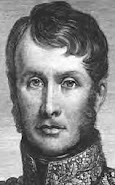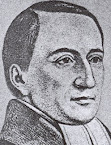Religious Freedom.
[by J. C. W. Lindemann] (concluded from Part 12)
And what dreadful tyranny is being practiced in Germany just now in the name of the (Union) Kaiser Wilhelm! [Frederick William III] A general freedom of religion is not to be proclaimed; oh no; as long as at all possible the "Emperor" also wants to exercise the power to prescribe to the citizens of the Empire what they shall believe, and wants to be able to punish them if they are "disobedient". Nevertheless, Baptists, Mennonites, Old Catholics, freethinkers, Jews, etc., are permitted to believe, preach, and write as they please; only the Lutherans are to have no freedom of conscience and free exercise of religion. They are to remain in the disorganized and divided national church, which itself does not know what truth is; and if they do not want to do so willingly, they will be fined, imprisoned, harassed with police supervision and military quartering.
The so-called "Lutheran" regional and provincial consistories, too, have very often played havoc with the church, which they were supposed to protect and care for. Instead of serving it, they have dominated it, — sold dispensations for money — put openly false teachers into office or left them in office — but pressed [against] faithful witnesses in pulpits and schools, punished them and even chased them out of office. They [the consistories] were all too often willing tools of the sovereigns, who posed as "chief bishops," while they were frequently enough only soldiers, hunters, police officers, friends of the theater, and merry brothers. Pious princes, who knew their position towards the church and wanted to serve it only "as most distinguished members", — pious and conscientious consistorial officials should not be adversely affected by them.
But whoever wants to learn more about the horrible tyranny of conscience that a church regime that is "Lutheran" in name can lead, should read Pastor Hörger's booklet: Das Pabstthum der bayerischen Landeskirche nothdürftig beleuchtet (Memmingen, 1873; available in St. Louis from Mr. Barthel) [English translation]. And whoever wants to see what atrocious conditions prevail in the Saxon State Church, which only unjustly still calls itself "Lutheran," should look once into Pastor Ruhland's book, which bears the title: Der getroste Pilger aus dem Babel der sächsischen Landeskirche in die lutherische Freikirche [EN] (and is also available from Mr. Barthel) But from the same one can also learn that such godless conditions in the church are only possible where the pastors and congregations are asleep and are not aware of the fact that Christ has acquired for them freedom, also freedom of faith and confession, and that this freedom is more precious than good days according to the flesh, than silver, gold and precious stone, than honor and reputation among men. Oh, many Lutherans do not miss religious liberty at all and are completely content to be left alone.
[Lindemann's Conclusion]
We Lutherans of America are in possession of this glorious good — and we enjoy it, not because we are worthy of it, or because we have acquired it for ourselves; for the religious liberty of this country is a gift of God, and it is He alone who has hitherto preserved it for us.
Let us be thankful and then watch that our freedom is not stolen from us!
He is grateful who recognizes the value of a gift, who knows that he has not earned it, and who praises the Giver and extols His deeds before others. — What about our gratitude with regard to religious freedom?
And it will certainly be stolen from us if we do not keep watch! Attempts have already been made, and will be made, to blend the State and the Church together again. The heart of the natural man is always inclined to this, especially that of the "great ones" in the State and in the Church. And we have an enemy in the country who has long been ready to secure religious liberty only for himself, but not to tolerate, oh no, to suppress all those of other faiths! That is the Roman clergy, — that is the many archbishops, bishops and priests, that is above all also the recently installed Cardinal of the Pope. This Pope, according to Roman doctrine, is also a temporal prince, over all Christian countries of the earth, therefore also over the United States; his servants are not merely church servants, but also state servants; and in particular the Cardinal, according to the oath he has taken, is obliged to help to exterminate all "heretics”.
Now everybody knows how the Pope's empire in America is growing larger and larger, — how great masses of the people blindly obey their ecclesiastical leaders; — everybody can also know how the papists seek and hunt for political influence, and have in part already attained it. They will gladly seize the reins as soon as circumstances are favorable to them!
Therefore we are to watch! That is, we are to discern the enemy [Page 28] from God's Word, to watch for his intentions and actions, and to testify against him to the best of our ability, so that he may be recognized and put out of harm's way.
But, though the pope is the most dangerous enemy of our religious liberty, there are others. Every one who attempts to command us in matters of faith, — to control our consciences, — every one who attempts, under the pretext of benefiting religion, to give laws of state which prescribe to any man faith, worship, etc., is an enemy to our religious liberty, — to whom we should resist by all lawful means, and not submit to him. But the country is full of such people; that is what all political and religious enthusiasts are trying to do.
Therefore it is not a matter of sleeping and snoring, of being indifferent and ignorant; but it is a matter of taking care and watching that no one robs us of the precious good of our American religious freedom. — Woe to us if we or our children ever again fall into such spiritual slavery, that we must believe what worldly rulers or wretched clergymen command us, — that we must arrange our worship as pleases "gracious lords in high places!"
God takes His gifts from the ungrateful, or lets them be his ruin; He gives more to the grateful, or at least blesses them in the enjoyment of His goods. We are to secure this blessing for ourselves and for our children, so that "religious freedom" may be preserved for us in the land, and we may serve our God as Scripture and conscience demand.
"The real object of this amendment to the Constitution is not to encourage, much less to propagate Mohammedanism, or Judaism, or unbelief, by setting aside Christianity; but to put an end to the strife of rank between the Christian parties of the church, and to prevent the rise of a national church, whose priesthood would have enjoyed the protection of the government exclusively. It cuts off all means of religious persecution (the abomination and pestilence of former centuries), and of infringing the rights of conscience in matters of faith, which had been trampled upon from the times of the apostles to the present." — Justice Joseph Story













